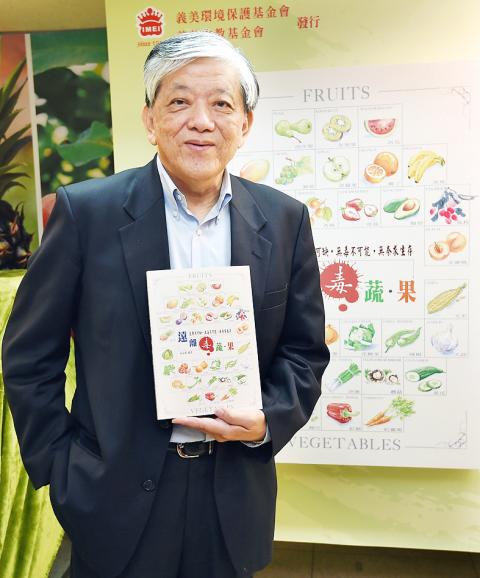The Executive Yuan on Saturday rejected an accusation by I-Mei Foods Co general manager Kao Chih-ming (高志明) that the Food and Drug Administration (FDA) had hurt the company’s sales in China by telling Chinese authorities about irregularities in I-Mei products.
Executive Yuan spokesman Sun Lih-chyun (孫立群) said Premier Mao Chi-kuo (毛治國) had received a petition from Kao earlier in the week complaining that the FDA’s action had made it harder for I-Mei exports to clear Chinese customs.
The FDA denied the accusation, saying it did not give its Chinese counterpart any information on recent food inspection at I-Mei factories, during which nine-year-old pre-packaged Lunar New Year meals were discovered.

Photo: Liao Chen-huei, Taipei Times
Those past-expiration date items were not for export and were definitely not being sold to China, a FDA spokesman said on Friday. The Straits Exchange Foundation and China’s Association for Relations Across the Taiwan Straits signed an agreement in 2008 to notify each other of information concerning food safety related to cross-strait trade.
Kao presumed that Chinese customs had received reports from the FDA on the July 2 and July 3 inspections, because I-Mei received a letter from Chinese authorities on July 5 that said I-Mei products were not allowed to clear customs because of quality problems.
Sun said that after checking with the FDA, the government was sure that it had nothing to do with I-Mei’s problems with Chinese customs.
The Cabinet also regretted that Kao blamed the government, Sun said.
The FDA said its inspectors accidentally found the outdated Lunar New Year dishes while conducting a regular check on non-alcoholic beverages at I-Mei factories.
Kao’s suggestion that the FDA might have had a political motive in releasing its inspection reports to the media immediately after the incident was unacceptable, Sun said.
I-Mei’s image suffered another blow last week when a woman in Beigang, Yunlin County, found dead worms and eggs in a pack of I-Mei chocolate-coated raisins she bought.
An I-Mei spokesman said the company reclaimed the package and sent it to food inspection authorities to determine the source of contamination.
Kao has been a vocal critic of the government’s handling of several food safety scandals that have erupted in recent years.
He said in December last year that changes to food laws in response to the scandals had increased the penalties, but failed to educate the public or small businesses about food safety, and he urged the premier to help restore Taiwan’s reputation as a food kingdom.

Civil society groups yesterday protested outside the Legislative Yuan, decrying Chinese Nationalist Party (KMT) efforts to pass three major bills that they said would seriously harm Taiwan’s democracy, and called to oust KMT caucus whip Fu Kun-chi (傅?萁). It was the second night of the three-day “Bluebird wintertime action” protests in Taipei, with organizers announcing that 8,000 people attended. Organized by Taiwan Citizen Front, the Economic Democracy Union (EDU) and a coalition of civil groups, about 6,000 people began a demonstration in front of KMT party headquarters in Taipei on Wednesday, organizers said. For the third day, the organizers asked people to assemble

POOR IMPLEMENTATION: Teachers welcomed the suspension, saying that the scheme disrupted school schedules, quality of learning and the milk market A policy to offer free milk to all school-age children nationwide is to be suspended next year due to multiple problems arising from implementation of the policy, the Executive Yuan announced yesterday. The policy was designed to increase the calcium intake of school-age children in Taiwan by drinking milk, as more than 80 percent drink less than 240ml per day. The recommended amount is 480ml. It was also implemented to help Taiwanese dairy farmers counter competition from fresh milk produced in New Zealand, which is to be imported to Taiwan tariff-free next year when the Agreement Between New Zealand and

A woman who allegedly spiked the food and drinks of an Australian man with rat poison, leaving him in intensive care, has been charged with attempted murder, the Taipei District Prosecutors’ Office said yesterday. The woman, identified by her surname Yang (楊), is accused of repeatedly poisoning Alex Shorey over the course of several months last year to prevent the Australian man from leaving Taiwan, prosecutors said in a statement. Shorey was evacuated back to Australia on May 3 last year after being admitted to intensive care in Taiwan. According to prosecutors, Yang put bromadiolone, a rodenticide that prevents blood from

China is likely to focus on its economy over the next four years and not set a timetable for attempting to annex Taiwan, a researcher at Beijing’s Tsinghua University wrote in an article published in Foreign Affairs magazine on Friday. In the article titled “Why China isn’t scared of Trump: US-Chinese tensions may rise, but his isolationism will help Beijing,” Chinese international studies researcher Yan Xuetong (閻學通) wrote that the US and China are unlikely to go to war over Taiwan in the next four years under US president-elect Donald Trump. While economic and military tensions between the US and China would